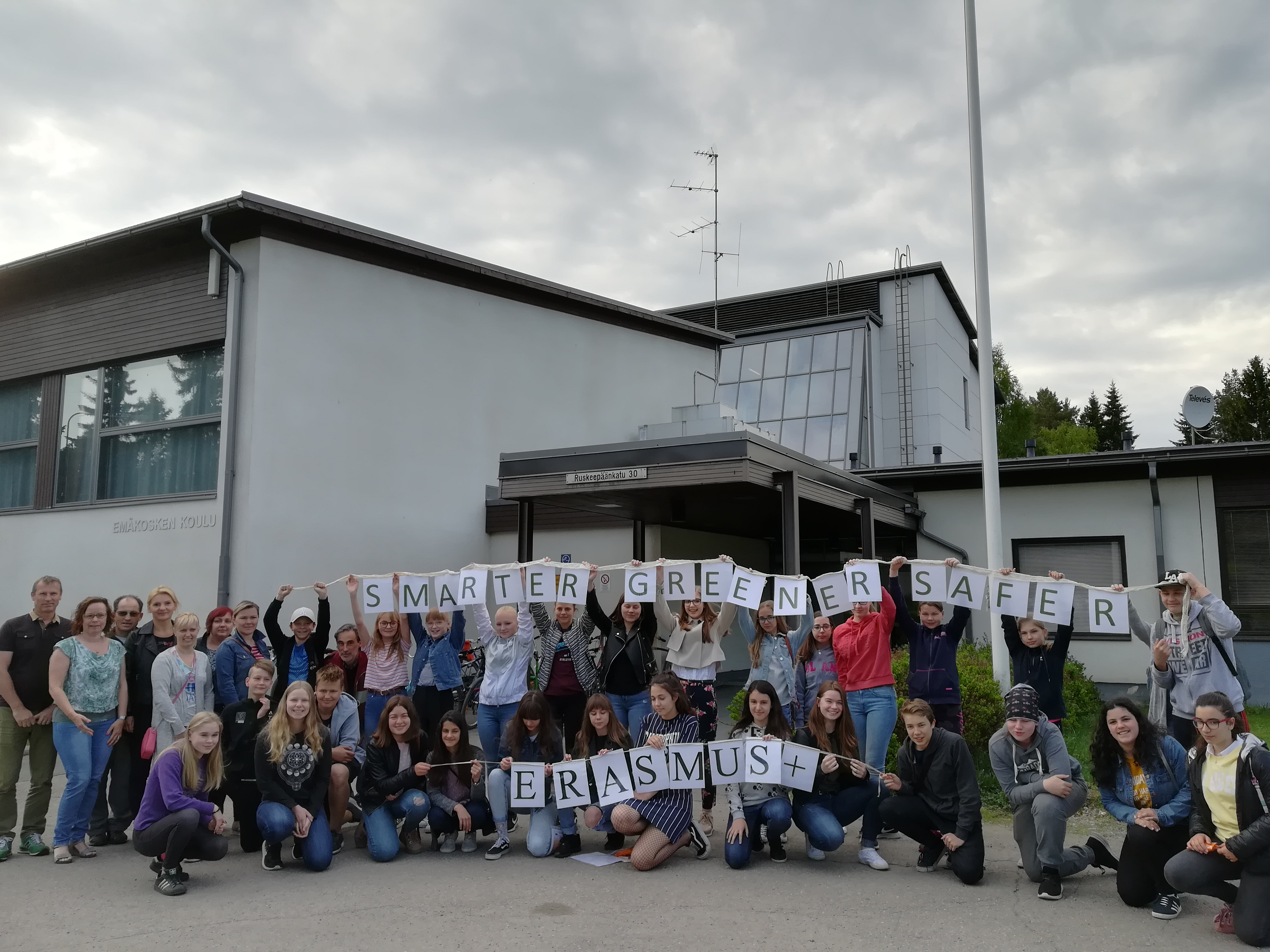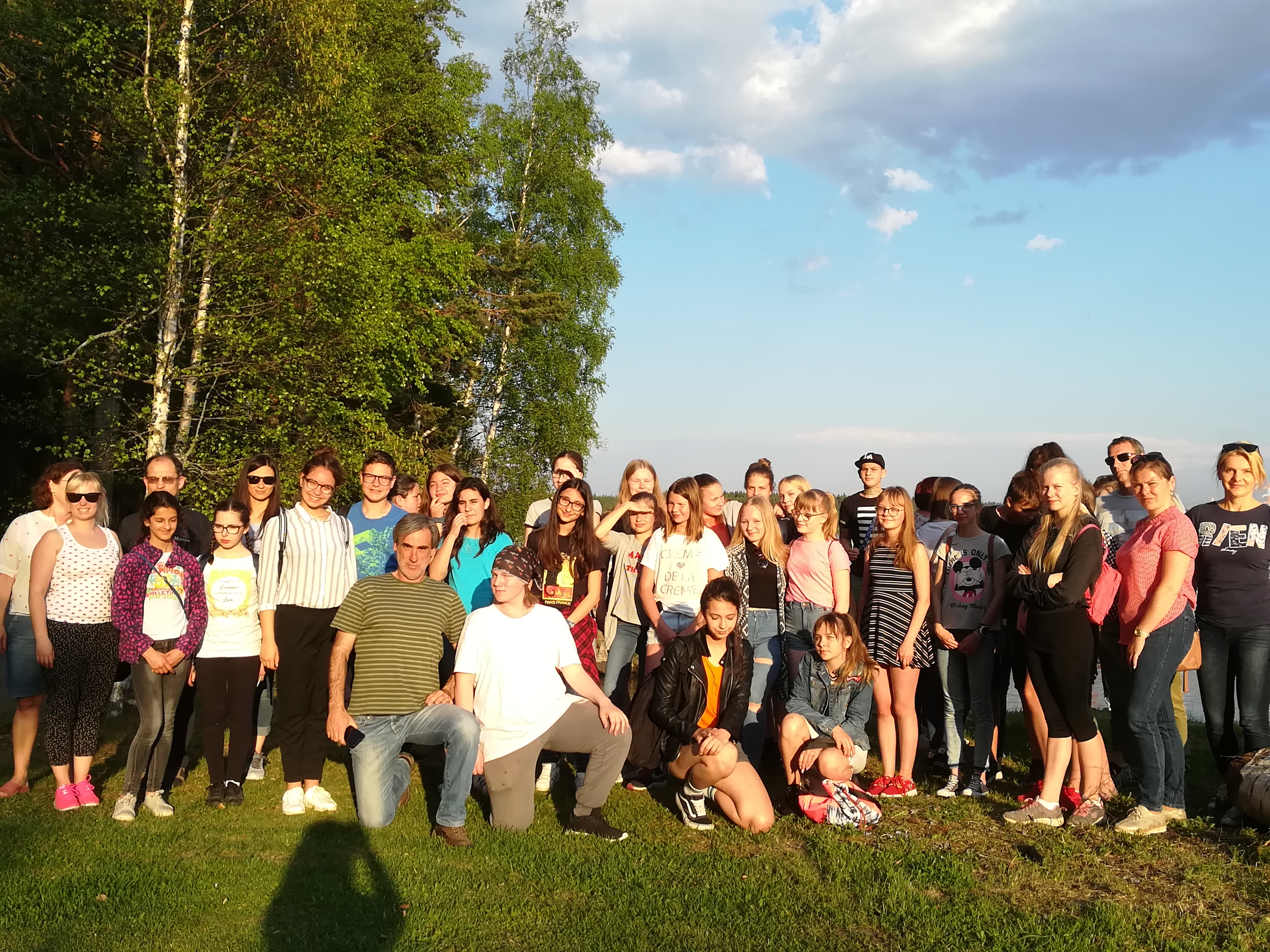LTT activities
l. osnovna škola Čakovec, Croatia, 26-31 May 2019
The short-term exchange hosted by l. osnovna škola Čakovec, Croatia took place on 26-31 May 2019. Each partner school was represented by 4 or 5 students and 2 or 3 teachers. In total, there were 18 students (aged 13-14) and 9 teachers from 4 partner schools. The students were selected on the basis of initial regulations set in all partner schools. The teachers were mainly Science, Biology, Geography, Maths, English, IT, PE teachers and others taking active part in the project implementation. The main theme of the first exchange was: GREEN ENTREPRENEURSHIP - Scientific/entrepreneurial skills incorporated by the use of newest technologies. The main objective of the activity was to exchange environmental experience and combine it with entrepreneurial skills, also with the use of newest technologies. The following activities took place:
- exchange students prepared the 4th part of Green E+Dictionary, peer-to-peer interactive videos containing instructional material on newest technologies used for entrepreneurial purposes e.g. planning and managing ‘green business’. Each team prepared 2 videos, they were presented and shared by all partners during the meeting. The entries of the Green E+Dictionary explain the basic issues concerning environmental protection and suggest green entrepreneurial ideas. The videos were compiled as one of the final project results.
- the students worked out the next part of Greenpreneur’s Book (GREEN ENTREPRENEURSHIP – working out a ‘green business plan’ with the use of the newest technologies), they worked in international groups using collaborative problem solving method; they worked out suggestions for eco-friendly houses, where they could use their scientific and entrepreneurial skills gained under the project; the outcomes of international groups’ work became part of the main project product
- out-of-classroom eco event; students visited Accredo Adrenaline Park, they worked in international teams cooperating together and solving problems in a collaborative way; the students collaborated to design a waste dumpster and disseminate the green issues
- the participants took part in eco workshops for students and teachers conducted by IT teachers on practical usage of newest technological gadgets (3D printer, microbit) to design eco objects; eco workshop for students by Environment Protection Organisation Nobilis Croatia took place (making bird houses)
- Green Business – in cooperation with Humana Nova (a social business, fighting textile waste and unemployment of the disabled) students produced simple objects out of recycled materials; designing a waste dumpster required collaborative work and promoted eco attitude
- the international team opened the Green Energy Park in the schoolyard; designing and constructing simple innovative ecological devices throughout the project helped develop collaborative problem solving sills and strengthened students’ ecological awareness
- the exchange participants visited a local company Rimac Automobili- a technology powerhouse, manufacturing electric hypercars and providing full technology solutions to global automotive manufacturers; the participants learned how newest technologies combined with eco solutions contribute to environmental protection
- the participants learned about ways of preserving natural heritage in other European countries and in different eco-systems while visiting neighbouring natural sites and planting trees; a visit to the Varaždin City Museum fostered biodiversity education
The final mobility strengthened the international integration of the project group. It emphasised the need for international collaboration to act for the benefit of natural environment as different countries have varied experience and possess varied facilities. Learning about other cultures, boosting linguistic competences were additional benefits of the cooperation. The teachers taking part in the meeting started summarizing the project activities implemented so far, commenting upon the effectiveness, evaluation and dissemination procedures. Croatian students (aged 13-14) and teachers from the host school attended all the activities. Students’ parents got actively involved and local authorities supported the activities.
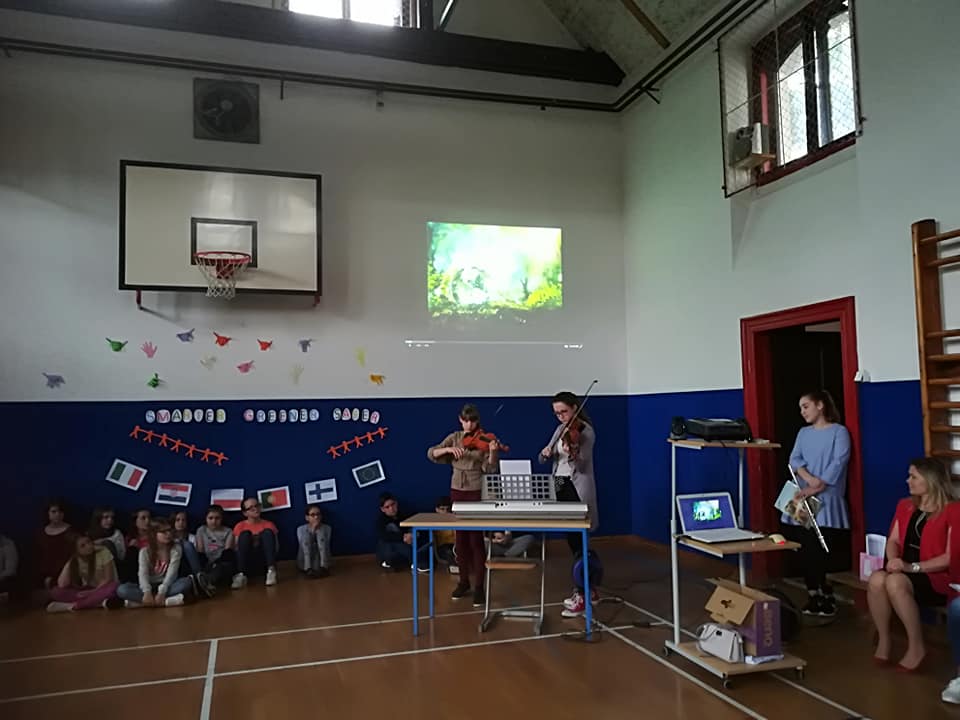
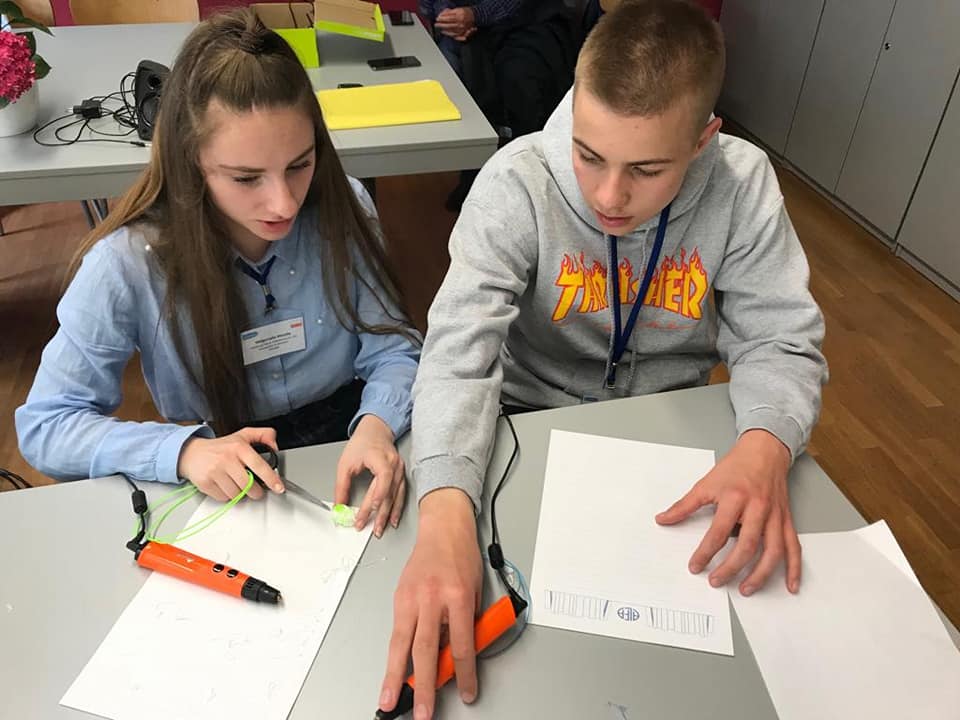
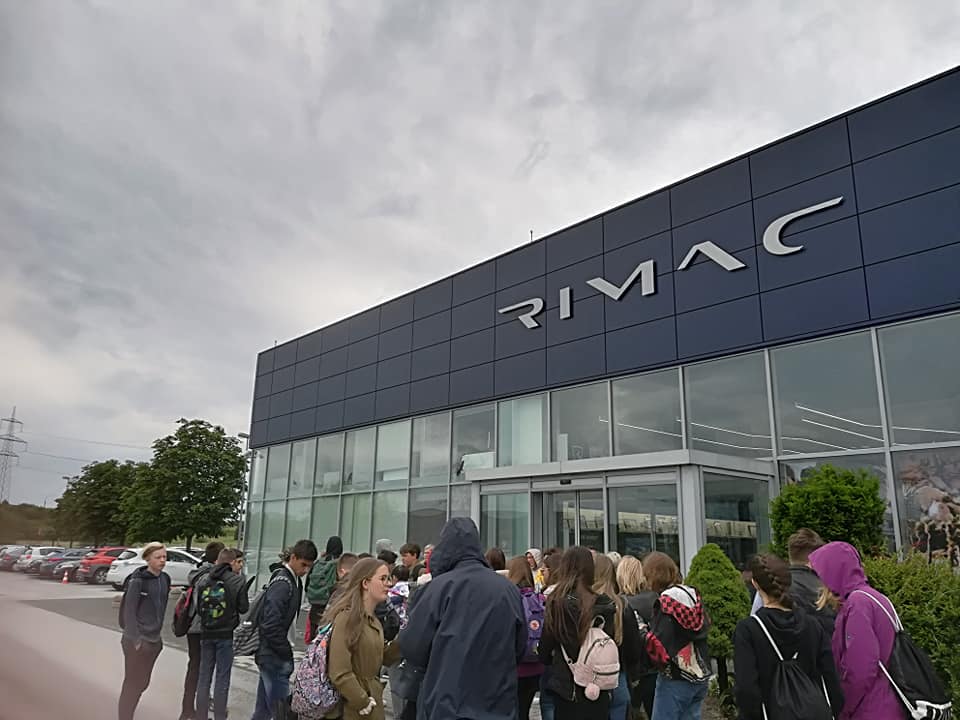
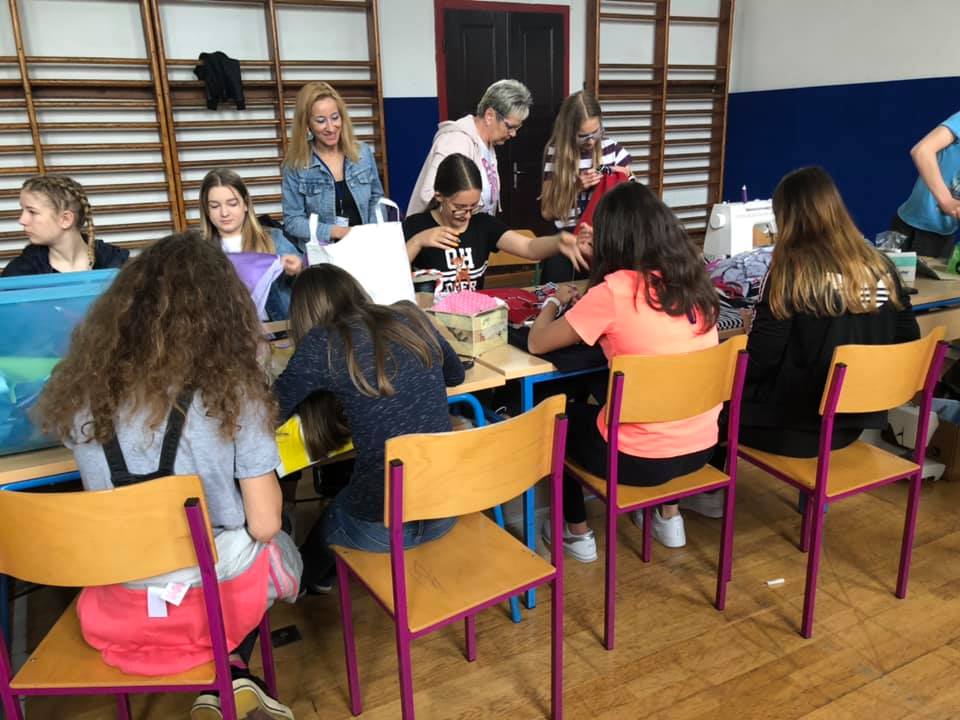
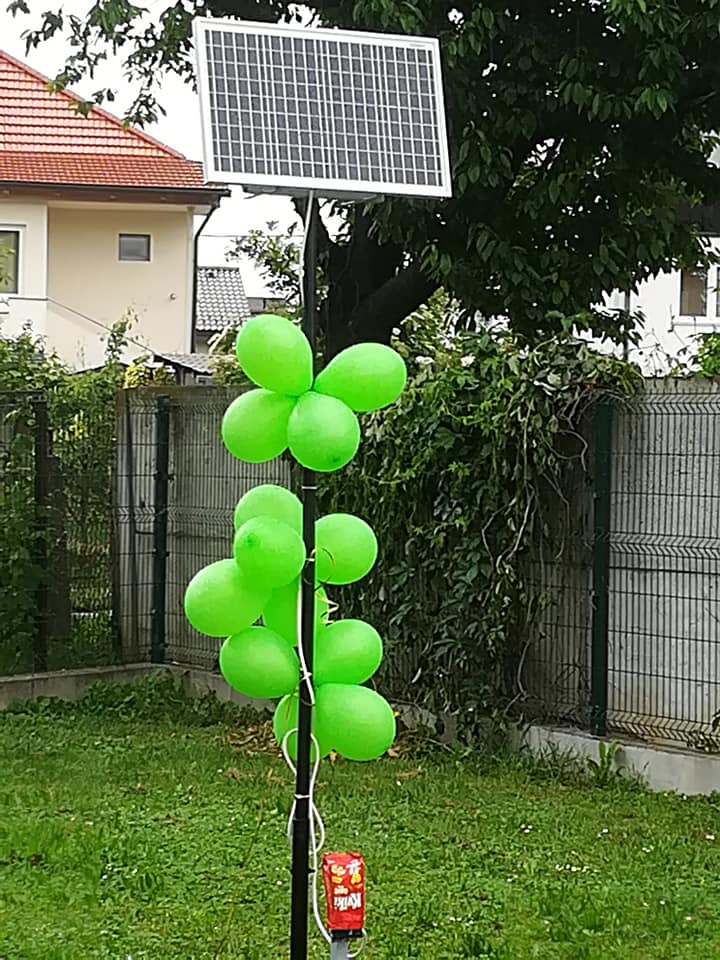
Agrupamento de Escolas de Vila Nova de Paiva, Portugal, 4 -9 November 2018
The short-term exchange hosted by Agrupamento de Escolas de Vila Nova de Paiva, Portugal, took place on 4 -9 November 2018. Each partner school was represented by 4 students and 2 teachers. In total, there were 16 students (aged 13-14) and 8 teachers from 4 partner schools. The students were selected on the basis of initial regulations set in all partner schools. The teachers were mainly Science, Biology, Geography, Maths, English, IT, PE teachers and others taking active part in the project implementation. The main theme of the first exchange was: GREEN TECHNOLOGIES – energy saving innovations/devices, ecological attitude. The main objective of the activity was to exchange experience in the use of newest green technologies and combine scientific and entrepreneurial elements in environmental education. The following activities took place:
- the students prepared the next part of Green E+Dictionary, peer-to-peer interactive videos containing instructional material on saving energy and green technologies used in European countries. The videos were presented and shared by all partners during the meeting. They helped exchange good practices in ecological education in partner countries. The videos were uploaded to the project website and compiled as one of the final project results.
- the students worked out the next part of Greenpreneur’s Book (GREEN TECHNOLOGIES – information on green technologies + useful advice on energy saving), they worked in international groups using collaborative problem solving method; the outcomes of international groups were uploaded to the main project website and became part of the main project products
- the participants discussed the final version of GreenSmart Stories – an educational product compiled after the short-term exchange to Poland
- the students and teachers took part in workshops on newest energy saving technologies/devices lead by Edufor_Educational Training Centre of Mangualde at Innovative Classroom Lab
- the participants visited “Arbutus do Demo” Botanical Park, famous for its multidisciplinary nature, covering the areas of environment, tourism, culture and science; The “ideal” classroom allowing for out-of school eco education; students designed T-shirts presenting Green Golden Rules on recyclable materials promoting eco attidude
- the international group visited Voltalia at Oliveira de Frades – renewable energy producer and green service provider specializing in solar and wind energies
- the exchange group visited the Environment and Planning Department of Aveiro University and took part in workshops on the use of wind power and waste disposal
- the participants visited ‘Douro Sul’ Wind Park and ‘Wind Art project’ learning about newest technologies used to generate green energy and how it got combined with local culture
- international group compared ways of preserving natural heritage (depending on different eco-systems); a visit to the Atlantic Ocean coast helped understand the usage of wind energy and tidal energy being a unique experience to most participants, a visit to Barra Lighthouse and Costa Nova´s houses provided the participants with natural heritage education
- the participants learned about other cultures - Autumn Flavours Fair at Vila Nova de Paiva Grouping of Schools was organised by the hosting school
- the meeting participants planted trees in the schoolyard, contributing to the natural environment preservation
- the exchange participants took part in meetings with local authorities, local community representatives, this way spreading the project ideas within wider groups which will become further multipliers of the environmental issues; meetings with parents, teachers, local artists strengthened the project promotion
- all the exchange activities were recorded to create the next part of the video series
The mobility contributed to exchange of experiences and good practices concerning natural heritage preservation, work in a collaborative way and linguistic competences development.
The teachers taking part in the meeting discussed the project activities implemented so far, commenting upon the effectiveness, evaluation and dissemination procedures. The activities were attended by a group of Portuguese students (aged 13-14) and teachers from the hosting school. Students’ parents got actively involved and local institutions supported the activities (organisation, visits, workshops, cultural events), this way the project got disseminated to wider audiences.

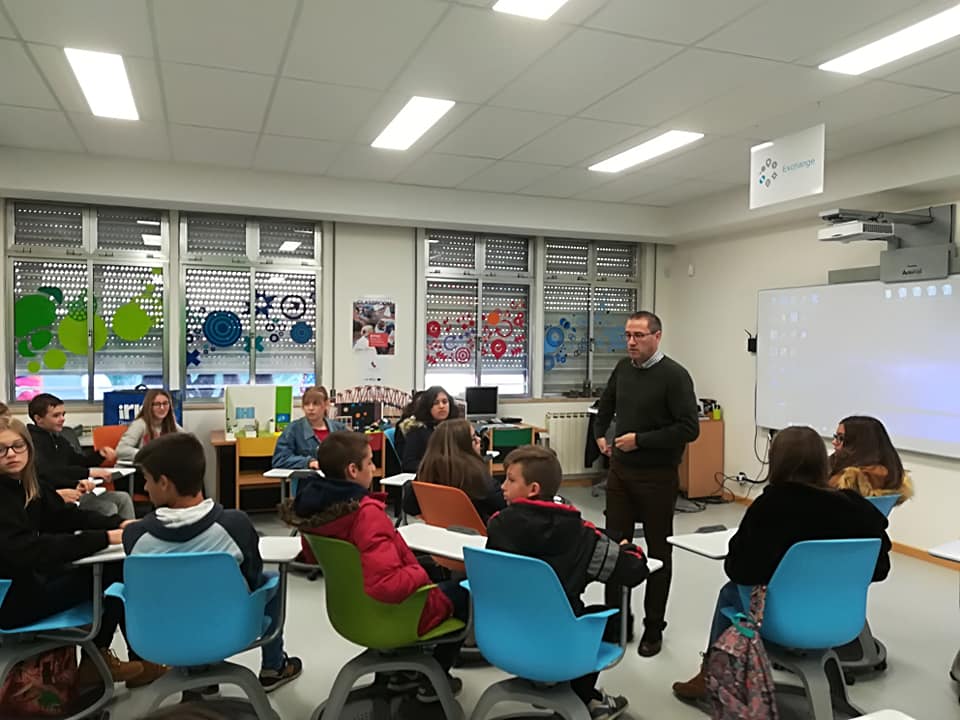
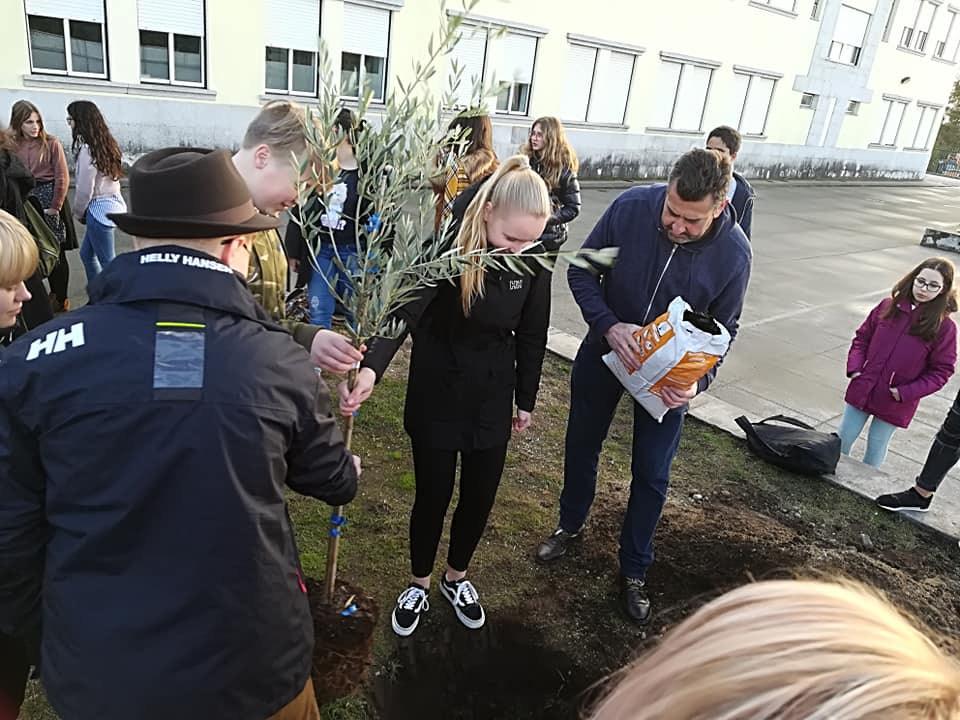
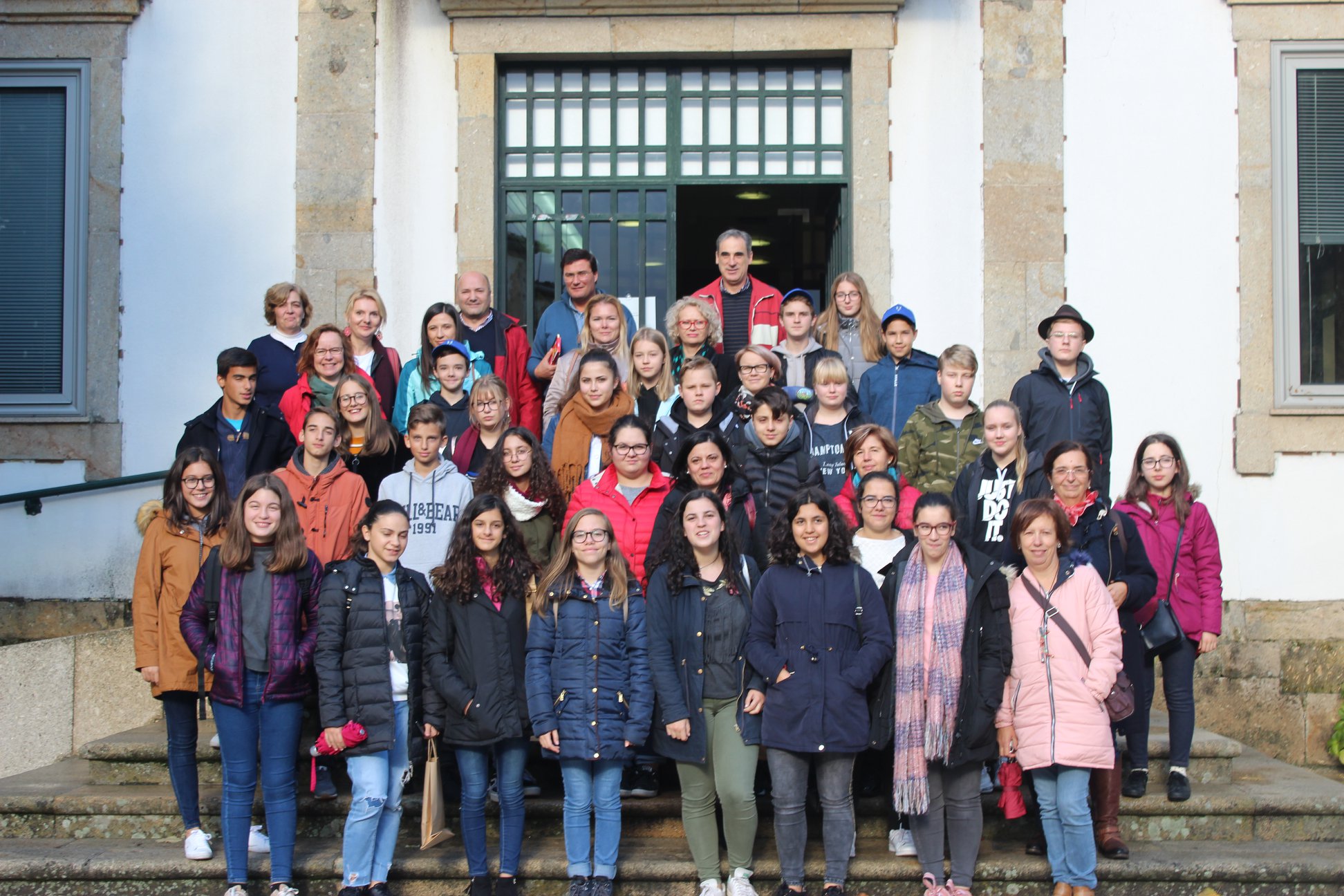
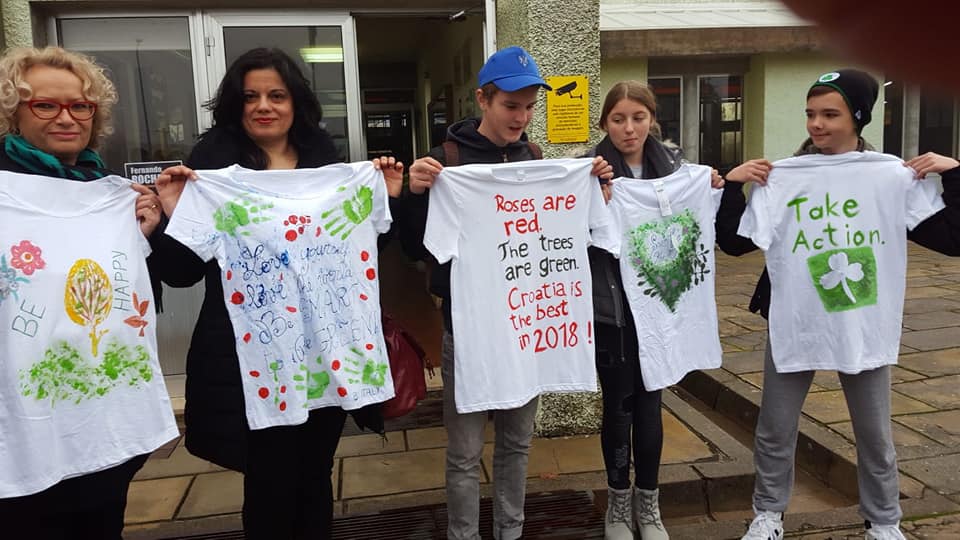
I Spoleczna Szkola Podstawowa, Zamosc, Poland (18-23 March 2018)
The first short-term exchange took place in I Spoleczna Szkola Podstawowa, Zamosc, Poland (18-23 March 2018). Each partner school was represented by 4 students and 2 or 3 teachers. In total, there were 16 students (aged 13-14) and 9 teachers from 4 partner schools. The students were selected on the basis of regulations set at the beginning of the project implementation in all partner schools. The teachers were mainly Science, Biology, Geography, Maths, English, IT, PE teachers and others taking active part in the project implementation. The main theme of the first exchange was: GREEN ENERGY – renewable sources of energy across Europe and in partner countries. The main objective of the activity was to exchange experience between European schools and combine scientific and entrepreneurial elements in environmental education. The following activities took place:
- students worked on Green E+Dictionary part 1, consisting of peer-to-peer interactive videos with instructional material on renewable energy sources and ways of using and saving green energy (each team prepared at least 2), the recordings were presented and shared by all partners. They are a great source of information about different experiences and methodologies used in ecological education in partner countries. The videos were uploaded to the main project website and they were compiled as one of the final project results.
- students worked out the first part of Greenpreneur’s Book (GREEN ENERGY – containing information and useful advice on energy saving), international groups used collaborative problem solving method; the outcomes were uploaded to the main project website and becąme part of the main project products in the end
- students and teachers took part in the City Game – out-of-classroom eco event (the game required collaborative problem solving in the Old Town of Zamość, students had to combine their scientific knowledge with entrepreneurial skills); international groups conducted ‘Eco Survey’ among the inhabitants of Zamosc, the survey provided participants with information on local attitude to energy saving issues and was a great tool to disseminate the project ideas among wider groups
- ‘Swap It Green’ 1 - the meeting participants exchanged books, CDs, etc. to promote anti-consumerist attitude, the event took place at the hosting school so that more of the local community could get involved
- ‘Eco-Survival’1 (The Catastrophe in a Desert) workshop to use scientific and entrepreneurial knowledge in practice. The workshop involved the need for collaborative problem solving (PBL) and integrating scientific subjects and entrepreneurial education (multidisciplinary approach). Both students and teachers worked in international teams and worked out solutions to an eco-problem.
- seminars on green energy at Roztocze Centre for Science Education led by representatives of Roztocze National Park; a visit to ‘Nature Zoom’, a scientific and educational centre in Janów Lubelski; and the exhibition ‘The World of Senses’ at Zamosc Arsenal, integrating scientific subjects by the use of technologies and interactive equipment available on display
- creative entrepreneurial story-telling – teachers discussed the progress of work on GreenSmart Stories, which was the continuation of the workshop on storytelling in entrepreneurial education already conducted by ISSP (TPM1). The stories constitute educational material on science and entrepreneurship integration.
- the students and teachers planted trees in Zamość ZOO, the trees are being taken care of by the Polish Erasmus+ team and are a contribution to pro-environmental activity.
The exchange group visited Roztocze National Park where they learned about the region and Polish natural heritage. They attended the meeting with the mayor of Zamosc and the Director of Educational Department in the Town Hall of Zamosc, they got presented with valuable facts on Polish educational system and the region’s potential.
Participants compared ways of preserving natural heritage in different eco-systems and worked in a collaborative way. The activities were attended by a numerous group of Polish students (aged 13-14) and teachers from the hosting school. Students’ parents and local institutions got actively involved (organisation, visits, workshops, city-game), this way the project ideas were clearly highlighted and the ecological lifestyle promoted in local community as well.
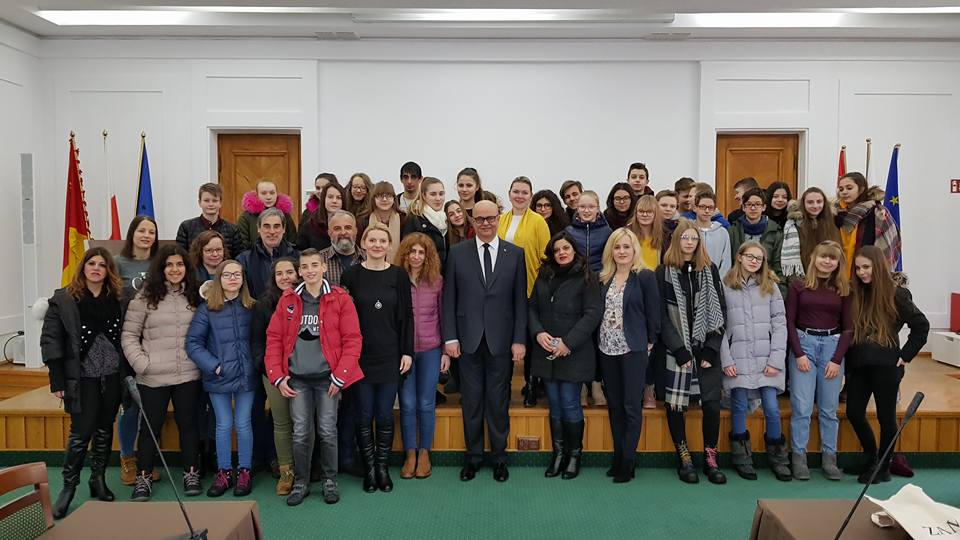
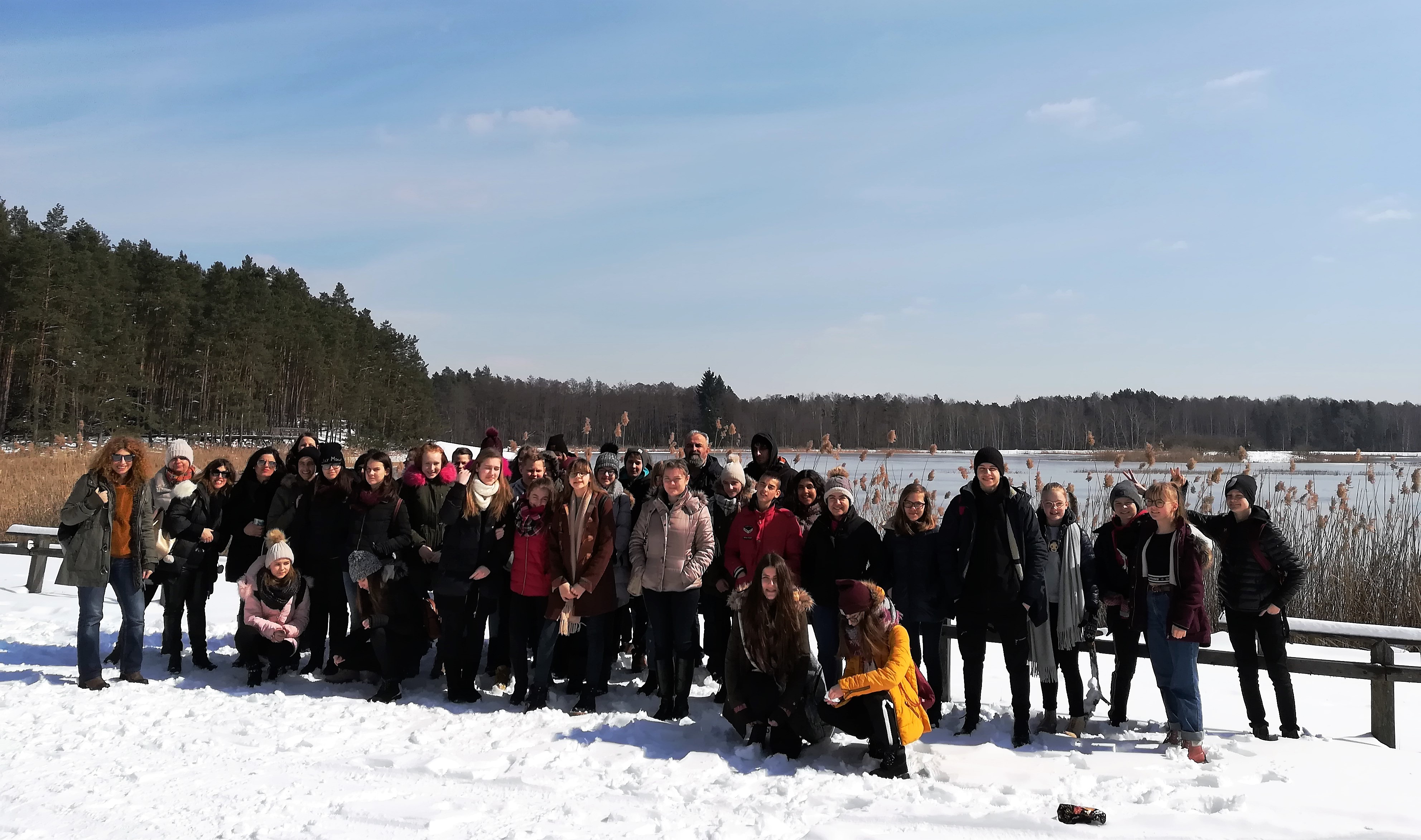
Emakosken koulu, Nokia, Finland, 13-18 May 2018
The short-term exchange of groups of students hosted by Emakosken koulu, Nokia, Finland took place on 13-18 May 2018. All project partners attended the meeting and each school was represented by 4 or 5 students and 2 or 3 teachers. In total, there were 18 students (aged 13-14) and 9 teachers from 4 partner schools. The teachers taking part in the meeting were mainly Science, Biology, Geography, Maths, English, IT, PE teachers and others taking active part in the project implementation. The students were selected on the basis of accepted regulations (e.g. students’ involvement in the project activities, ability to cooperate within a group and responsibility for undertaken tasks). The external aspects, such as students’ availability e.g. external exam dates, were also taken into consideration. The main theme of the meeting in Finland was: GREEN THINKING – ideas on recycling, waste disposal, anti-consumerist attitude, natural heritage protection. The following activities took place:
- the students prepared the next part of the Green E+Dictionary; peer-to-peer interactive videos containing instructional material on recycling, waste disposal, anti-consumerism. The videos were presented and shared by all partners during the meeting. They helped exchange good practices in ecological education in partner countries. The videos were uploaded to the main project website and they were compiled as one of the final project results.
- the students worked out the next part of Greenpreneur’s Book (GREEN THINKING – containing information on recycling, waste disposal, anti-consumerism + useful advice), they worked in international groups using collaborative problem solving method; the outcomes of international groups were uploaded to the main project website became part of the main project products
- the students observed Science lessons conducted by Finnish teachers and took part in scientific workshops
- the students made innovative and practical objects out of recyclable materials – the lessons conducted by Finnish teachers with the help of Finnish students; students integrated their ecological knowledge with entrepreneurial skills; the objects produced were displayed and shared by the participants
- the international group visited eco-friendly sites (nature reserve - Siuro) and companies promoting green solutions (TAMMERVOIMA Waste Combustion Station; MELO Power Station); students saw how newest technological solutions are used in practice to save energy and prevent environmental degradation
- ‘Eco-Survival’ 2 event at Urhattu resort – international groups used scientific and entrepreneurial knowledge to solve problems collaboratively and put scientific and entrepreneurial theory in practice; the tasks required scientific knowledge and strategic thinking
- Swap It Green! Part 2 – the meeting participants exchanged books, CDs, etc. to promote anti-consumerist attitude, the event took place at the hosting school so that more of the local community could get involved
The meeting participants planted trees in Emakosken koulu schoolyard and had a chance to compare ways of preserving natural heritage in a different eco-system. The mobility allowed the teachers and students for the exchange of experiences and good practices concerning natural heritage preservation and work in a collaborative way. It also contributed to the intercultural education and linguistic competences development.
The teachers taking part in the meeting discussed the project activities implemented so far, with special emphasis on their effectiveness, evaluation and dissemination channels. All the time, the activities were attended by a group of Finnish students (aged 13-14) and teachers from the hosting school. Students’ parents got actively involved and local institutions supported the activities (organisation, visits, workshops, eco-event), this way the meeting gave a chance for all parties to exchange ideas, learn from one another and to disseminate the project. The project ideas were clearly highlighted and the ecological lifestyle promoted.
